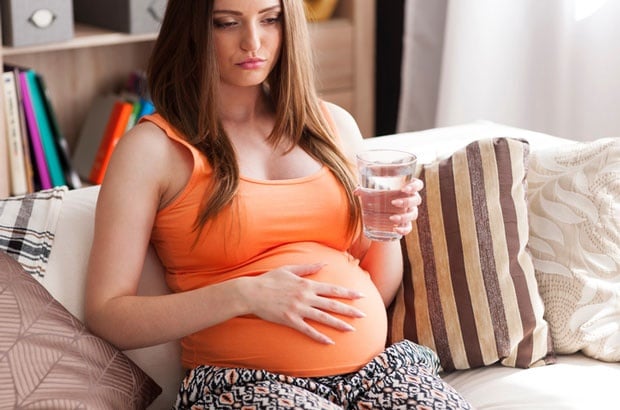
This article first appeared in the February/March 2016 issue of Your Pregnancy magazine.
Your body produces more female hormones than usual while you’re pregnant. These hormones have the important job of ensuring that your pregnancy develops as it should, but their presence does cause some unwelcome side effects. One of them is increased constipation.
Constipation during pregnancy occurs for four main reasons
- Slow digestion
- Pressure on the intestines
- Influence of hormones
- Lack of moisture
The high levels of progesterone relax the smooth muscle walls of the bowel, slowing down the entire digestive tract.
As if this wasn’t enough, the increasing pressure of the growing uterus on the intestines causes them to be pushed into an even smaller space. This means that it becomes even more difficult for the waste to move through the mass of pulsing muscular tubing.
The longer waste stays in the bowel, the more moisture is absorbed, so the waste gets harder and even more difficult to expel. Nature slows down your digestive tract for a very good reason.
Food stays in the stomach longer so that the placenta has more time to absorb the necessary nutrients to pass to your baby.
This means that it takes longer for your body to expel its waste. Other causes include irregular eating habits, stress, some medications, including iron remedies, lack of fibre and exercise, or too little intake of fluids.
What are the signs of constipation?
- More than four days between bowel movements.
- Dry, hard stools that are painful and difficult to pass.
- If you're left with a feeling that not everything has passed when you do have a bowel movement.
- If there’s bleeding from the rectal area when hard stools have been passed.
- Lack of appetite and not being able to face food.
- Bloating of the lower abdomen, cramp, spasm and pain.
- Having a headache and general unease are signs of constipation and dehydration.
You're at increased risk to suffer with constipation in pregnancy if...
- You’re already prone to bouts of constipation.
- You have nausea and vomiting and aren’t managing to eat as much as you should be.
- You have irritable bowel syndrome (IBS).
- Pregnancy-induced anaemia may make constipation worse, as well as some of the medications used to treat anaemia.
- You don’t exercise. Lack of exercise makes your whole system sluggish.
As your pregnancy progresses, increased pressure on your pelvic area makes constipation more likely. While you have no influence over your hormones or the decreasing space in your abdomen, there’s a lot you can do to prevent constipation from happening, and ways to manage it if it’s a problem.
Constipation isn’t life threatening, but it can become uncomfortable and can make haemorrhoids/piles much worse. Tackle constipation before it becomes a problem.
- Also see: Pregnant tummy troubles
Prevention is better than cure
Stay active! Brisk walking several times a week will wake up your system. Other forms of exercise, like swimming and yoga, are also a good idea. Drink at least eight cups of water a day. Sip it throughout the day, and you’ll not find yourself in the loo as much as if you drink a glass quickly every hour or so.
Limit your intake of tea and other caffeinated products such as coffee and colas. These can irritate your bladder and make you want to urinate more often.
You need roughage to assist with digestion. Add high fibre foods to your diet. Eat raw or cooked fruits and vegetables and whole grain products, like wholewheat bread, brown rice and oatmeal. Sprinkle your salads, fruit, vegetables and breakfast cereals with crushed linseeds and prunes. Chew your food well.
Try to take your iron supplements with orange juice or prune juice. Follow good bowel habits. Respond immediately to your body’s cues.
When to worry
When you’re experiencing repeated rectal bleeding or abdominal pain, and nothing seems to help, notify your doctor immediately as there may be something more serious going on, such as intestinal inflammation or parasites.
Top 10 tummy tips
Eating a small handful of raisins before going to bed will stimulate normal elimination in the morning
1. Drinking either hot or very cold liquid on an empty stomach may help stimulate your bowels. On waking, have a large glass of very warm water with a squeeze of lemon to get you moving and to balance your pH.
2. Keep a small footstool in the bathroom. Placing your feet on the stool will provide better leverage and prevent unnecessary straining, which could lead to piles.
3. Psyllium (ispagula husks), the seeds from plantain, may be effective for constipation, especially if you have IBS. Eating prunes can be just as effective and tastes better. If you’re taking medication for a heart condition, please check with your caregiver before using psyllium. Linseeds (flaxseeds) are rich in fibre and essential fatty acids, and can be used as an alternative to psyllium. Be sure to drink at least one large glass of water for each tablespoon of linseeds you consume.
4. Take probiotics. This will ensure healthy intestinal flora and improve overall digestive function.
5. Try a tablespoon of molasses and raw honey every day. Importantly, always talk to your doctor about any remedy you may try.
6. Midwife Jacky De-Boer recommends abdominal massage in an anti-clockwise direction, around the outer borders of your uterus. She says, “Although your faeces move in a clockwise direction, the peristaltic movement of your intestine is in fact anti-clockwise. If you do this, you will stimulate the intestines instead of just moving the faeces along.” Add a few drops of lavender or dill and mandarin oil mixed in a carrier oil when you do this.
7. Dandelion tea may ease constipation. Steep the leaves in boiling water and drink it daily.
8. Reflexology can make a difference to constipation, as it regulates bowel movement. You can do this by massaging the arches of your feet. The arches correspond to the digestive system. Massage in a circular, clockwise motion, for about five minutes on each foot. Use the same blend of oils as for the abdominal massage.
9. Take 10 Segiro drops, orally, three times daily to stimulate peristaltic activity.
10. One tablet of Nat Mur tissue salt taken three times daily will assist with the passing of dry hard stools.
Do you have a question about your pregnancy health that you'd like an expert's feedback on? Email to problems@yourpregnancy.co.za and we may publish your question along with advice from a specialist. Please note that we cannot supply personalised advice.




 Publications
Publications
 Partners
Partners










